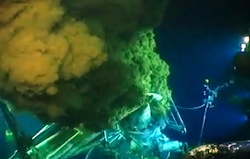Nukes Are Not Solution to Gulf Oil Spill, Experts Say
June 3, 2010
Featured Image
Today's top nuclear policy stories, with excerpts in bullet form.
Stories we're following today, Thursday, June 3, 2010:
Nuclear Option on Gulf Oil Spill? No Way, U.S. Says - The New York Times [link]
- The chatter began weeks ago as armchair engineers brainstormed for ways to stop the torrent of oil spilling into the Gulf of Mexico: What about nuking the well?
- Stephanie Mueller, a spokeswoman for the Energy Department, said that neither Energy Secretary Steven Chu nor anyone else was thinking about a nuclear blast under the gulf.
- Government and private nuclear experts agreed that using a nuclear bomb would be not only risky technically, with unknown and possibly disastrous consequences from radiation, but also unwise geopolitically.
- It would violate arms treaties that the United States has signed and championed over the decades and do so at a time when President Obama is pushing for global nuclear disarmament.
- “It’s not going to happen,” he said. “Technically, it would be exploring new ground in the midst of a disaster — and you might make it worse.”
U.N. Council Expects to Move on Iran Sanctions Soon - Reuters [link]
- The U.N. Security Council is expected to vote on a draft sanctions resolution against Iran over its nuclear program soon, possibly within the next 10 days, Mexico's U.N. ambassador said on Wednesday.
- Western diplomats said on condition of anonymity that the six hoped to deliver the annexes to the 10 rotating council members by the end of this week.
- The annexes will contain members of and firms controlled by Iran's Islamic Revolutionary Guard Corps, entities belonging to the Islamic Republic of Iran Shipping Lines, and other individuals and companies linked to Iran's nuclear and missile programs to be subject to asset freezes and travel bans.
- Western diplomats said the end result was probably the best they could have hoped for, given China's and Russia's determination to avoid measures that might have undermined Iran's troubled economy.
What Nonproliferation Diplomacy Can and Can't Achieve - Joshua Pollack in The Bulletin of the Atomic Scientists [link]
- Less often mentioned is the third bargain [of the NPT], which is no longer operative: a deal between the United States and the Soviet Union to impose restraint on their respective allies.
- If the policy of restraint were to fail in response to Iran's nuclear program, [proliferation] would probably happen in the Middle East, not in Europe or in the Far East.
- Because the United States has amassed a network of alliances and bases across the Middle East and assumed responsibility for its security affairs, the spread of nuclear weapons in the region would be more America's problem than Russia's or China's.
- This divergence of threat perceptions among the permanent members of the Security Council has meant that addressing the greatest challenge to the nonproliferation regime today has not always emerged as the group's overriding concern.
- Little suggests that any officials in Beijing or Moscow actually wish to see Iran become nuclear-armed. But neither are as alarmed as their counterparts in Washington about the possibility.
Cheater's Risk Launch - The Stimson Center [link]
- As part of Stimson's "Unblocking the Road to Zero" project, which seeks to advance the debate about negotiated nuclear disarmament as a viable and practical policy option, Alex Bollfrass and Barry Blechman have developed Cheater's Risk, an online game that explores the dynamics of a world without nuclear weapons.
- Players take on the challenge of breaking out of a hypothetical disarmament regime without being detected by national intelligence services and international monitors. Depending on which country is selected, different pathways to the bomb are available. As the player navigates the pathways, the cumulative odds of detection are calculated.
- At the end, famed weapons inspector Hans Blix determines if the player has gotten away with it or has been caught. The game is founded upon empirical research, published in Elements of a Nuclear Disarmament Treaty, an edited volume showing how to overcome technical obstacles to disarmament.
- Cheating on a nuclear disarmament agreement is not nearly as easy as you might think.
- Watch the Cheater's Risk trailer:
Cheater's Risk Trailer from Henry L. Stimson Center on Vimeo.



